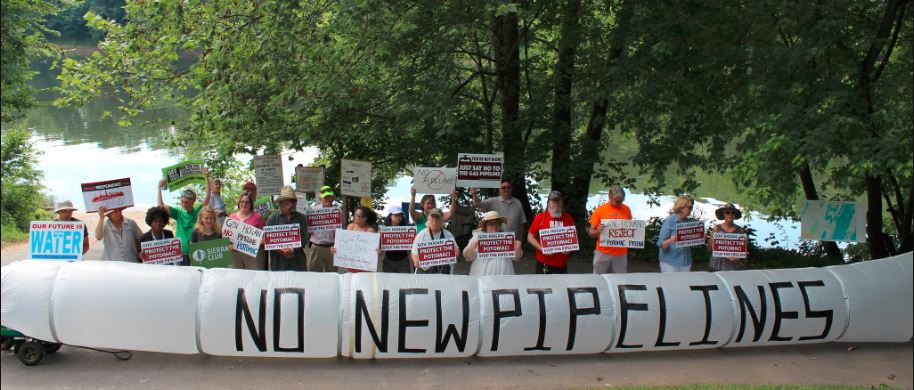
Enough is enough: Maryland is being overrun by proposed fracked-gas infrastructure and other looming dirty energy proposals in the state.
Despite rapidly intensifying climate change, Maryland is being overrun with proposed dirty energy infrastructure that will endanger clean water and frontline communities while making climate change worse. Right now, multiple pipelines and compressor stations for fracked-gas are being proposed. Already, the state has seen the construction of a massive liquefied natural gas export facility at Cove Point in Southern Maryland. Enough is enough. It is time to oppose new fossil fuels in Maryland.
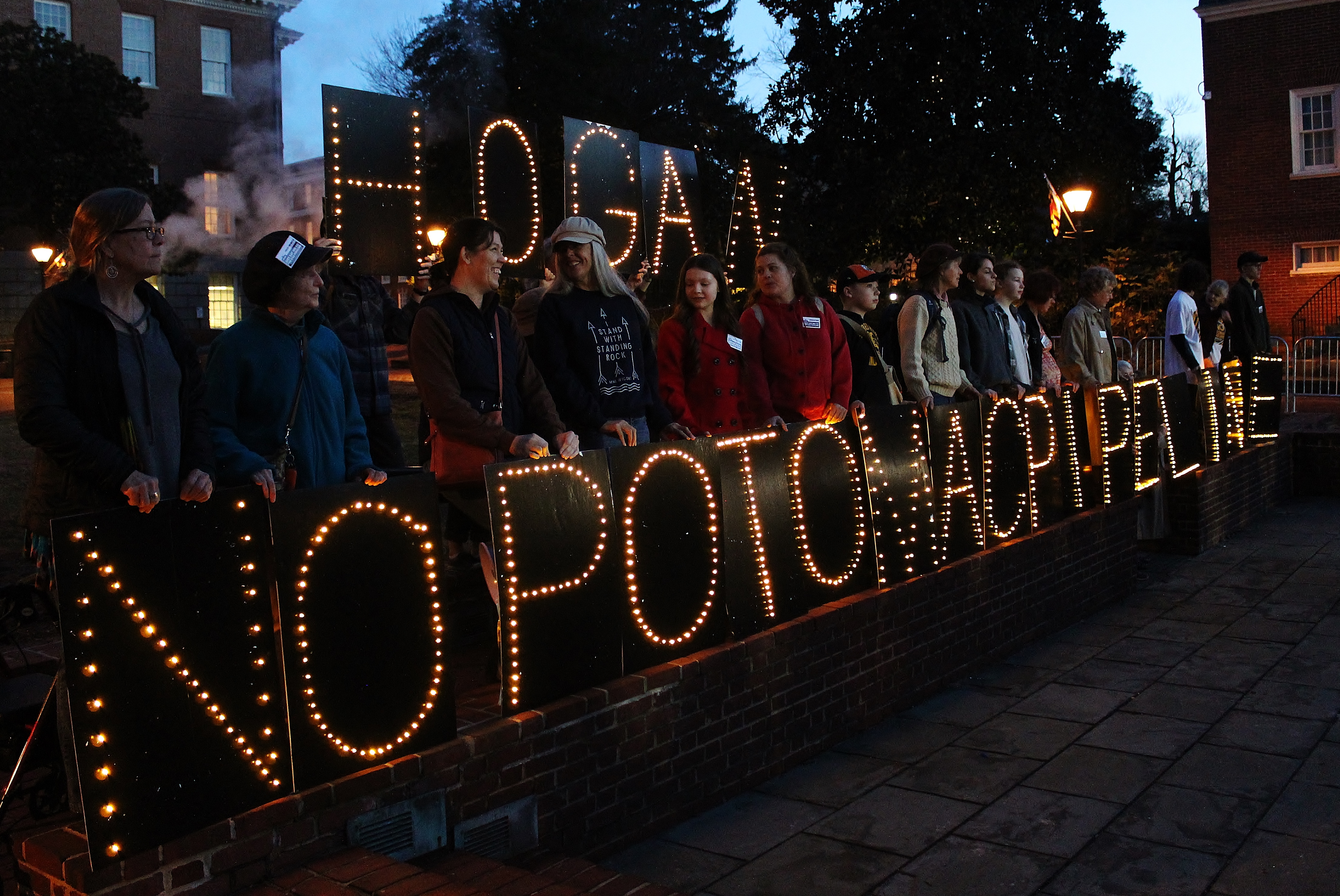
Marylanders have now launched a “No New Fossil Fuels” declaration to draw a badly needed line in the sand.
Here’s the problem: every time a new fracked-gas pipeline or liquefied natural gas facility or dirty compressor station is proposed, progressive groups and vulnerable landowners are routinely caught off guard. Dirty energy companies have already quietly negotiated with regulators and elected officials in closed meetings to virtually hardwire fossil fuel projects. Our side is then constantly playing defense from day one to stop projects like Transcanada’s Potomac Pipeline and Dominion’s Cove Point LNG facility in Southern Maryland.
The goal of the NNFF pledge is to take the clear OFFENSIVE step in laying down a marker that maintains a clear battle line from the start and makes it easier for all elected officials to understand that any new dirty energy project will be totally rejected by our groups from day one.
See the declaration in full here
Read more about Hogan’s fracked-gas expansion plans here
Sign the petition declaring “No New Fossil Fuels” in Maryland
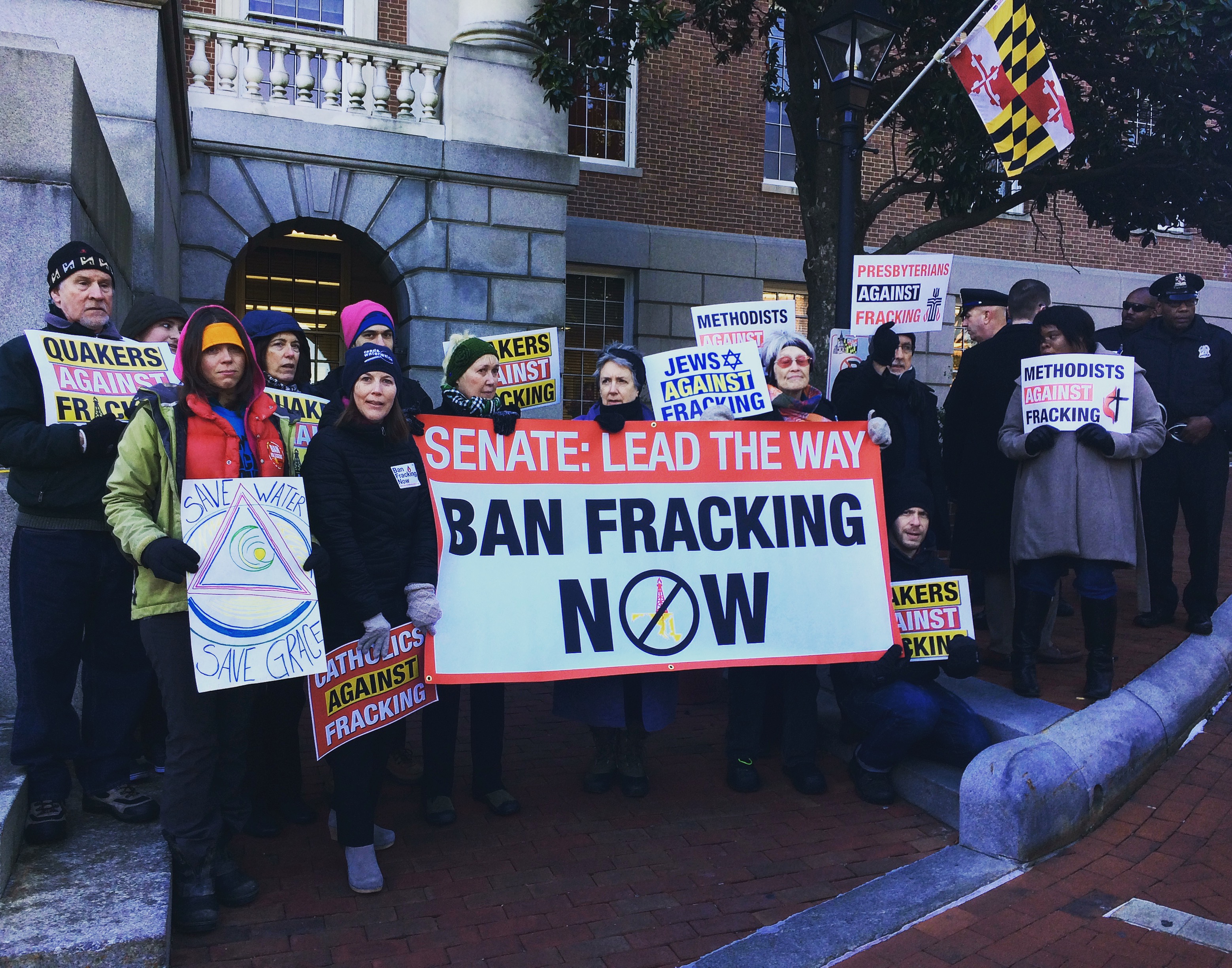 In 2017, Maryland became the first state with gas reserves to legislatively ban fracking. Over a thousand people marched in the streets of Annapolis, hundreds lobbied their legislators and over a dozen communities waged local fights forcing local governments to outright ban fracking in their municipalities. On Friday, March 17, 2017 a day after 13 people were arrested to call on the Senate to pass the fracking ban, Governor Hogan announced his support to ban fracking in our state. This was a result of activists across the state working like never before to protect their communities and our climate.
In 2017, Maryland became the first state with gas reserves to legislatively ban fracking. Over a thousand people marched in the streets of Annapolis, hundreds lobbied their legislators and over a dozen communities waged local fights forcing local governments to outright ban fracking in their municipalities. On Friday, March 17, 2017 a day after 13 people were arrested to call on the Senate to pass the fracking ban, Governor Hogan announced his support to ban fracking in our state. This was a result of activists across the state working like never before to protect their communities and our climate.
Unfortunately, at the federal level we are moving backwards and not forward on climate. There are efforts to revitalize the coal industry and the U.S. has withdrawn from the Paris Climate Accord. And here in Maryland, frontline communities are still under attack, with fracked-gas pipelines, compressor stations, and power plants being proposed all across the state. Governor Hogan has been throwing his weight behind an expansion of the natural gas industry in Maryland. The Public Service Commission recently approved a merger between Washington Gas and AltaGas that would invest over $100 million to jumpstart a natural gas expansion throughout our state — at Hogan’s request — a move that, thankfully, Maryland legislators blocked through legislation.
What we’re facing — and who’s fighting it
All across the state, there is fracked-gas infrastructure coming online. And all across the state, there are grassroots groups fighting to protect their communities. From pipelines to storage facilities to power plants to export terminals, the fights are many. Here’s a snapshot at some of them, along with the groups fighting back:
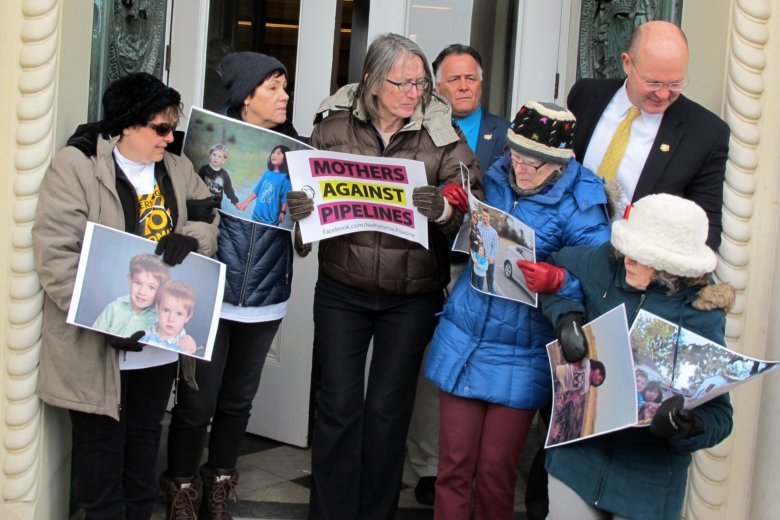
Transcanada’s “Potomac Pipeline”
The communities of rural Western Maryland and West Virginia are faced with a fracked-gas pipeline that would run underneath the Potomac River and endanger the drinking water source of over 6 million people. In January 2019, Governor Hogan and the Maryland Board of Public Works voted unanimously to reject a right-of-way easement for the project. This may be a turning point for Hogan on fracked-gas pipelines — only time will tell. However, the fight is not over. The companies behind the pipeline could still sue and try to build. The reason: Hogan failed to direct his Maryland Department of Environment to carry out a full, comprehensive review of the pipeline. As such, MDE allowed a blanket permit for the pipeline to be approved. Read more about it here: Stop the Pipeline under the Potomac.
Eastern Shore Pipeline
There’s a new pipeline threat coming to Maryland, and Maryland ratepayers are on the hook for it. Two proposed pipelines would connect to bring fracked gas from Delaware into Maryland down the Eastern Shore, threatening the region’s ecosystems and drinking water supplies, and causing irreparable damage to the land and our climate. Learn more here: No Eastern Shore Pipeline.
Cove Point
For 43 straight weeks, residents from Cove Point gathered in Annapolis to plead for a safety study around the Cove Point LNG facility — the first liquefied fracked gas export terminal on the East Coast and the first one in the world in such a densely populated area. Unfortunately, this natural gas export terminal began operating in January 2018, which has led to a surge of natural gas in the state. Stay updated here: We Are Cove Point.
Accokeek Compressor Station
In Charles County, residents fought to stop a Dominion compressor station — and won! To build it, Dominion had planned to lower the water table by 16 feet, endangering nearby wetlands and drinking water wells. It’s likely that Dominion will propose another compressor station elsewhere, but for now, the community is safe. Learn more with We Are Cove Point and the AMP Creeks Council.
C.P. Crane
The C.P. Crane facility was a coal-fired electric generation power plant located within the tidal Gunpowder River in Baltimore County, Maryland. CP Crane’s coal-fired power plant was removed from service in June 2018 when it was deemed unnecessary for electricity in the region. Despite the conclusion that this facility is not needed to meet our region’s electricity demands, there are plans to convert it into a highly polluting gas peaker plant. We are currently working to deny the permit necessary for this conversion. Read more here.
Brandywine Power Plants
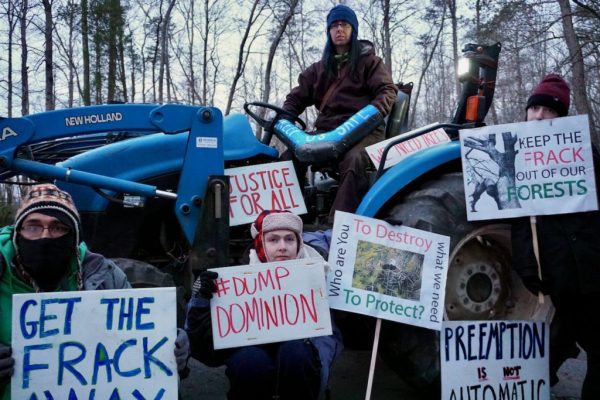
In Brandywine, the predominantly Black community is facing three coal and natural gas power plants within a 3-mile radius, with the third being in a cluster of five within a 13-mile radius. This is a clear example of environmental racism. Learn more: STOP Additional Brandywine, MD Power Plants Facebook page and Clean Air Prince George’s.
…and many more.
- See here for a running list of natural gas infrastructure threats to Maryland. If you know of a project not on this list, please email denise@chesapeakeclimate.org.
Hogan’s Fracking Hypocrisy
When Governor Hogan signed the fracking ban in 2017, he said: “Protecting our clean water supply and our natural resources is critically important to Marylanders, and we simply cannot allow the door to be opened for fracking in our state.” But since signing that ban, Hogan has worked consistently to undermine the spirit — if not the letter — of the law.
For months, his administration has been actively negotiating with controversial Canadian oil and gas companies to ship large amounts of fracked gas into and across Maryland. He has been kicking the doors down, in other words, for more fracked-gas infrastructure and gas combustion all across Maryland. In December 2017, his Administration explicitly called this gas, drilled using dangerous fracking in neighboring states, a “valuable resource” with “environmental benefits” and announced his ambitious plans to “kick-start a natural gas expansion…throughout Maryland.”
The Governor has launched this gas expansion effort while saying he supports the Paris Climate Agreements, even as scientists confirm that fracked gas is essentially as harmful to the climate as coal. Natural gas brought through Maryland to the export terminal at Cove Point was responsible for 1 million metric tons of greenhouse gas emissions in 2018. As for clean-energy substitutes to gas, the Governor vetoed a 2016 General Assembly law expanding wind and solar power and other renewable energy sources to make up 25% of the state’s grid. The GA was forced to override his veto in 2017. Read more about Hogan’s fracking hypocrisy here.
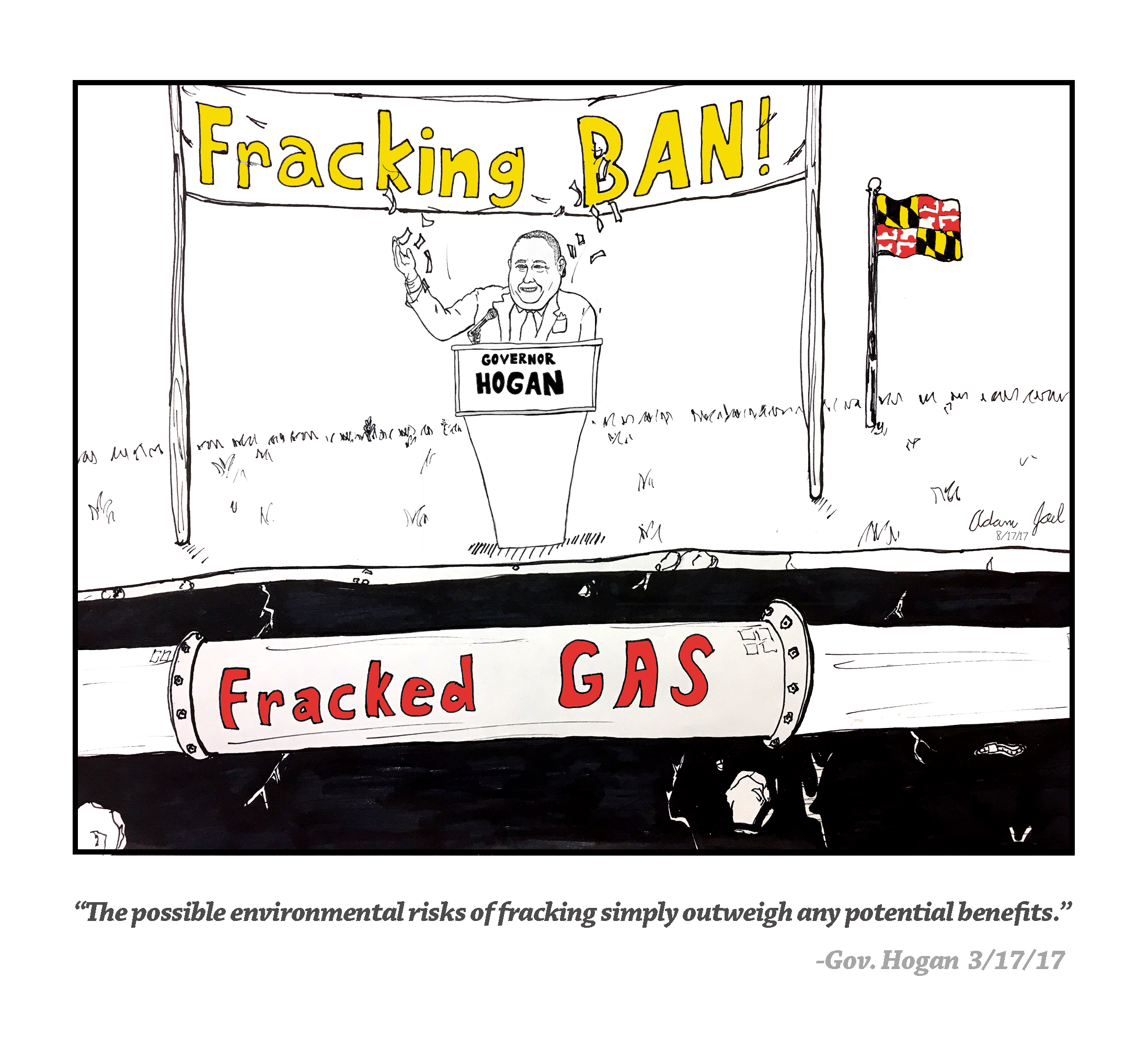
Possible Legislative Solutions:
Solution #1: Institute a PSC Climate Test
The PSC is Fueling the Fire: The Maryland Public Service Commission (PSC) regulates electricity and gas supply in the state. It approves new facilities that generate electricity and oversees the gas industry. Last year, when it approved a former coal plant repowering to gas, the PSC declared that “the Commission has never required that any consideration of climate change and its effects be included in a . . . proceeding.”
As an immediate fix to an immediate problem, legislators must direct the PSC to consider climate when making decisions. This “climate test” would provide a necessary and straightforward solution to the PSC’s refusal to consider climate change when making energy-related decisions.
LEARN MORE AND TAKE ACTION WITH CCAN ACTION FUND
Solution #2: Ensure that Maryland Fully Analyzes Pipelines’ Impacts to Water Quality
States have broad authority to fully review and ultimately deny a permit for an interstate natural gas pipeline if that review indicates that the project would violate the state’s water quality standards. This process is the one of only a few ways states can reject destructive pipelines from coming through their state. In the past, MDE has waived its authority to review pipelines and has failed to analyze all critical information regarding proposed pipeline construction. In 2018 Governor Hogan’s MDE permitted the construction of a fracked-gas pipeline underneath the Potomac River, risking the drinking water of over six million people. That permit was granted without the state performing a full, individualized review under the authority granted to it by section 401 the federal Clean Water Act. A bill called the “Pipeline and Water Protection Act” would fix that loophole. It would require MDE to analyze all critical information before it issues a permit for an interstate natural gas pipeline. It would ensure public access to important documentation submitted to MDE from the pipeline company and would require the pipeline company to hold public comment periods and public hearings in affected areas.
READ MORE WITH CCAN ACTION FUND.
It is time for environmental, grassroots, faith, labor and civil rights leaders to come together to say that we must protect our communities, our future, and our climate. That is why we our launching our No New Fossil Fuels Campaign. By joining together, we will let polluters and our elected leaders know that communities across the state will stand up to dirty fossil fuels and stand up for a future that protects our health.
Enough is enough. The science is clear. There can be no new fossil fuel development. No more pipelines. No more exploration of fossil fuels. We need a just transition to the clean energy economy now.
Take the first step: sign the petition declaring “No New Fossil Fuels” in Maryland.
Organizational sign-ons:
- Cedar Lane Unitarian Universalists, Chesapeake Climate Action Network, Chesapeake Physicians for Social Responsibility, Episcopal Diocese of MD, Food and Water Watch Maryland, Greenbelt Climate Action Network, Harford County Climate Action, Howard County Climate Action, Interfaith Power & Light, Maryland Environmental Health Network, Maryland League of Conservation Voters, Maryland State Conference of NAACP, Montgomery County Climate Mobilization, Sierra Club Maryland Chapter, Waterkeepers Chesapeake. See the list here.
Key articles:
- “FERC: No rehearing on Potomac pipeline.” Herald-Mail, 3/27/20
- “FERC Approves Eastern Shore Natural Gas Company Expansion.” Cision, 1/7/20
- “Maryland seeks dismissal of federal lawsuit by company blocked from building natural gas pipeline.” Baltimore Sun. 6/18/19
- “Keep your pipelines out of Maryland.” Washington Post. 6/7/19
- “Dozens rally to continue pipeline fight in Maryland.” Herald Mail Media. 5/30/19
- “Larry Hogan, reluctant environmentalist.” The Baltimore Sun Opinion. 1/7/19
- “Hogan votes against ‘Potomac Pipeline’ following years of opposition from activists.” The Washington Post. 1/2/19
- “Opponents of gas pipeline under Potomac River seek legislation to stop it.” Herald-Mail Media. 3/29/18
- “Environmental groups ask for rehearing on Columbia pipeline permit.” Morgan Messenger. 8/29/18
- “Advocacy group argues to intervene in Dominion compressor lawsuit.” Maryland Independent. 8/1/18
- “Another health risk heads for Charles County.” The Washington Post. 5/4/18
- “Tractor Blockade Shuts Down Clear-Cutting at Dominion Gas Compressor Site.” DC Media Group. 3/12/18
- “Across from Washington’s estate, a fight between natural gas and a historic view.” Washington Post. 6/27/18
- “The argument for fracking as a climate solution just went down in flames.” ThinkProgress. 6/25/18
- “Compressor stations are a new flashpoint in the debate over natural gas extraction.” Public Radio International. 8/14/16
- “Dangerous Neighbors: Pipelines, Compressor Stations, and Environmental Injustice.” Clean Water for North Carolina. 6/8/16
Resources:
- Read more about Hogan’s fracked-gas expansion plans here
- Factsheet: The Pipeline and Water Protection Act
- A Declaration of No New Fossil Fuels in Maryland
- Organizational sign-ons: No New Fossil Fuels in Maryland
- “The Natural Gas Gamble: A Risky Bet on America’s Clean Energy Future.” Union of Concerned Scientists, 2015
- “Environmental Impacts of Natural Gas.” Union of Concerned Scientists
- Comments on MDE’s proposed methane rules

